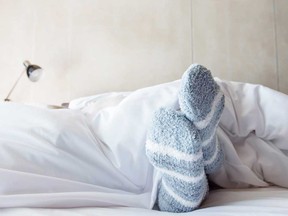Health
Warm Feet: A Science-Backed Method to Improve Sleep Quality

Struggling to fall asleep? Research suggests that warming your feet at night can significantly enhance your ability to drift off quickly. Several methods can be employed to achieve this, including taking a warm bath, soaking feet in warm water, or simply wearing socks to bed.
According to William Wisden, a professor at Imperial College London, warming extremities before sleep can help induce drowsiness effectively, akin to many over-the-counter sleep aids. “Having warm skin, especially hands and feet, induces drowsiness,” Wisden stated, highlighting a natural approach to improve sleep quality.
How Warming Your Feet Influences Sleep
The science behind this method lies in the body’s natural response to warmth. Studies indicate that heating the skin before bedtime not only makes individuals feel more tired but also triggers changes in brain activity linked to deeper sleep. A notable study published in Nature in 1999 found that dilation of blood vessels in the feet—prompted by warm socks—was a better predictor of how quickly individuals fell asleep than melatonin levels or subjective feelings of sleepiness.
A randomized controlled trial involving 46 men over 60 years old demonstrated that soaking feet in warm water one hour before sleep for six weeks improved both the speed of falling asleep and the duration of sleep. These findings are consistent across multiple studies focusing on older adults.
For those considering a warm bath or shower, a 2019 meta-analysis reported that even a brief soak of just 10 minutes before bed could lead to falling asleep approximately nine minutes faster and improve overall sleep efficiency. In comparison, melatonin supplements typically assist with falling asleep only about seven minutes quicker, while the prescription drug Zolpidem, also known as Ambien, helps users fall asleep within 10 to 20 minutes.
The Ideal Sleep Environment
It is crucial to note that the benefits of warming extremities are most effective when done closer to bedtime. Wisden cautions that taking a warm bath too early in the day, such as at 16:00, does not provide the same advantages. The scientific rationale suggests that warming feet helps the body cool down, which is essential for initiating sleep. A warm environment does not guarantee a good night’s rest; it must be coupled with a cooler room temperature.
The body typically experiences a core temperature drop of 2 to 3 degrees Fahrenheit as sleep begins, and maintaining this drop is vital for deep sleep. Many individuals find themselves waking up in the night due to overheating, often after wearing socks to bed. This discomfort can stem from various factors, including sleepwear, bedding, and the room’s temperature. Wisden recommends using multiple layers to allow for adjustments throughout the night, enabling individuals to manage their microenvironment effectively.
Determining the ideal room temperature for optimal sleep can be contentious. The National Sleep Foundation suggests an ambient temperature of 60 to 67 degrees Fahrenheit. However, personal preferences can vary significantly, with many individuals arguing passionately about what constitutes a comfortable sleeping environment.
Another consideration for sleep quality is the impact of certain medications. Nonsteroidal anti-inflammatory drugs (NSAIDs), such as ibuprofen and aspirin, can counteract the benefits of warming the skin before bed. Research indicates that these medications tend to constrict small blood vessels, which can disrupt sleep cycles and impact melatonin production. As an alternative for pain relief, acetaminophen may be a better option, as studies have shown it does not have the same adverse effects on sleep.
In conclusion, warming your feet before bedtime presents a simple yet effective technique to enhance sleep quality. Whether through a warm bath, foot soak, or cozy socks, this strategy not only offers a natural alternative to sleep aids but also aligns with the body’s physiological needs for a good night’s sleep. For further information on health and wellness topics, visit Healthing.ca, a member of the Postmedia Network.
-

 World4 months ago
World4 months agoScientists Unearth Ancient Antarctic Ice to Unlock Climate Secrets
-

 Entertainment4 months ago
Entertainment4 months agoTrump and McCormick to Announce $70 Billion Energy Investments
-

 Lifestyle4 months ago
Lifestyle4 months agoTransLink Launches Food Truck Program to Boost Revenue in Vancouver
-

 Science4 months ago
Science4 months agoFour Astronauts Return to Earth After International Space Station Mission
-

 Technology2 months ago
Technology2 months agoApple Notes Enhances Functionality with Markdown Support in macOS 26
-

 Top Stories3 weeks ago
Top Stories3 weeks agoUrgent Update: Fatal Crash on Highway 99 Claims Life of Pitt Meadows Man
-

 Sports4 months ago
Sports4 months agoSearch Underway for Missing Hunter Amid Hokkaido Bear Emergency
-

 Politics3 months ago
Politics3 months agoUkrainian Tennis Star Elina Svitolina Faces Death Threats Online
-

 Politics4 months ago
Politics4 months agoCarney Engages First Nations Leaders at Development Law Summit
-

 Technology4 months ago
Technology4 months agoFrosthaven Launches Early Access on July 31, 2025
-

 Top Stories2 weeks ago
Top Stories2 weeks agoFamily Remembers Beverley Rowbotham 25 Years After Murder
-

 Top Stories5 days ago
Top Stories5 days agoBlake Snell’s Frustration Ignites Toronto Blue Jays Fan Fury





















